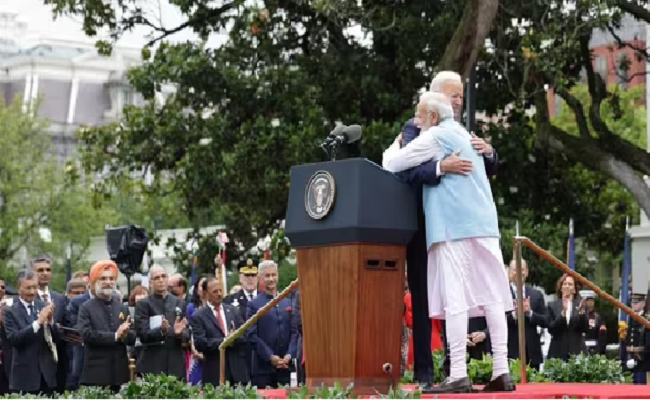Continuous downpour submerges Kolkata, Jodhpur Park receives highest rain
.gif)
.gif)

In a significant development, Prime Minister Narendra Modi of India and US President Joe Biden have strengthened bilateral ties and united in their efforts to dismantle the terror infrastructure in Pakistan, along with its jihadist proxies operating in Jammu and Kashmir.
The joint statement issued by the two leaders emphasizes the need to combat cross-border terrorism and the use of proscribed terrorist groups as proxies to evade sanctions. It also urges Pakistan to take action against these groups and prevent them from using any territory under its control to launch attacks against India.
Notably, the joint statement explicitly names several terrorist organizations targeting India, including Al Qaeda, ISIS, Lashkar-e-Toiba, Jaish-e-Mohammed, and Hizbul Mujahideen. The joint efforts of Modi and Biden highlight their condemnation of cross-border terrorism and the exploitation of proxy groups by Pakistan. The leaders demand that those responsible for the 26/11 Mumbai attacks and the Pathankot airbase attacks be brought to justice. Pakistan's reluctance to designate Sajjid Mir, the mastermind behind the 26/11 attacks, has drawn criticism, with India, the US, and Israel eagerly awaiting his punishment.
The joint statement also addresses three crucial points aimed at dismantling the terror infrastructure in Pakistan. Firstly, it draws attention to the use of drones by Pakistan-based jihadists for smuggling arms, communication devices, and even planning the infiltration of terrorists across the border. The US and India strongly urge Pakistan to halt this activity and pledge to collaborate in combating the misuse of drones. Intelligence reports suggest that Jaish-e-Mohammed is experimenting with using heavy drones to drop terrorists across the border.
Secondly, both India and the US pledge to jointly designate Pakistan-based jihadists under the 1267 United Nations Security Council (UNSC) resolution. This involves sharing counter-terrorism intelligence and enhancing cooperation between law enforcement agencies in both countries. Despite China's expected use of its veto power to shield terrorists from global designation in the UNSC committee, India and the US remain determined to weaken the terror factories in Pakistan. They are actively working together to prepare the necessary documentation for UN designation.
Lastly, the joint statement highlights the reference to the Financial Action Task Force (FATF) and the need for improved standards to combat money laundering and terrorist financing. This signals that the US, which previously allowed Pakistan to escape the FATF's grey list, is now willing to reconsider and potentially reinstate Islamabad on the same list if it fails to take action against terrorists and terror groups. Consequently, Pakistan faces the looming threat of FATF sanctions if it continues to employ terrorist groups to further its political objectives against India, the US, and other nations.
Pakistan has predictably criticized its mention in the joint statement as "misleading and unwarranted."